Examining the Olympics: Sustainability, History, Theoretical Impacts
VerifiedAdded on 2023/04/23
|11
|2882
|492
Essay
AI Summary
This essay provides a sociological analysis of the Olympic Games, emphasizing its global significance and various constituent factors. It delves into the historical background, inherent meanings, and both positive and negative impacts of the Olympics. The analysis covers the principles of sustainability, including environmental, socio-cultural, and economic aspects, and examines the historical roots of the Games, including the evolution of women's participation. The essay also applies theoretical perspectives from management theory, tourism, and social sciences, such as strategic management, sustainable tourism development, feminism, social learning, and evolutionism, to understand different facets of the Olympics. It concludes by discussing the short-term and long-term positive and negative after-effects on stakeholders, highlighting the importance of sustainability and ethical considerations in future Olympic events. Desklib offers this essay and many other resources to support students' academic needs.
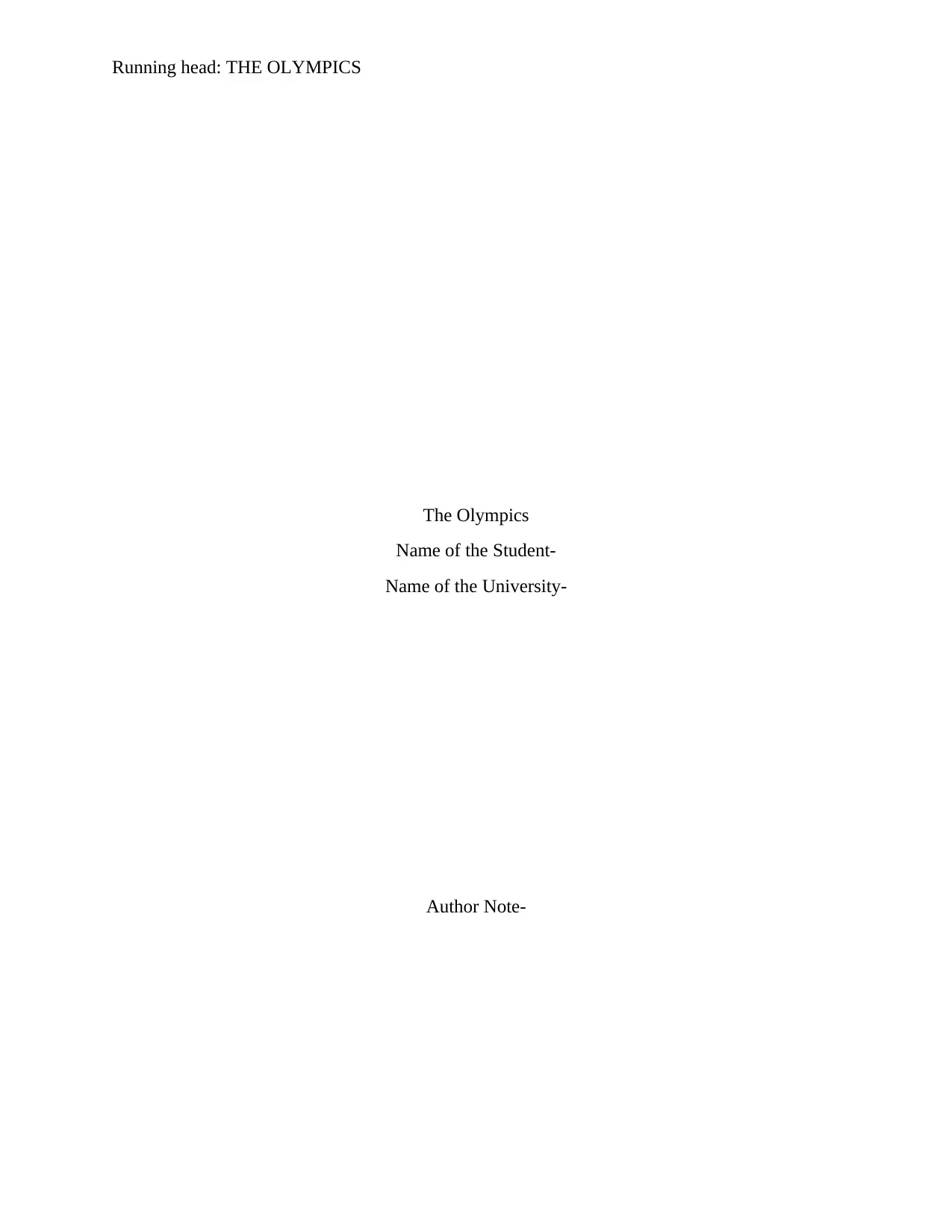
Running head: THE OLYMPICS
The Olympics
Name of the Student-
Name of the University-
Author Note-
The Olympics
Name of the Student-
Name of the University-
Author Note-
Paraphrase This Document
Need a fresh take? Get an instant paraphrase of this document with our AI Paraphraser
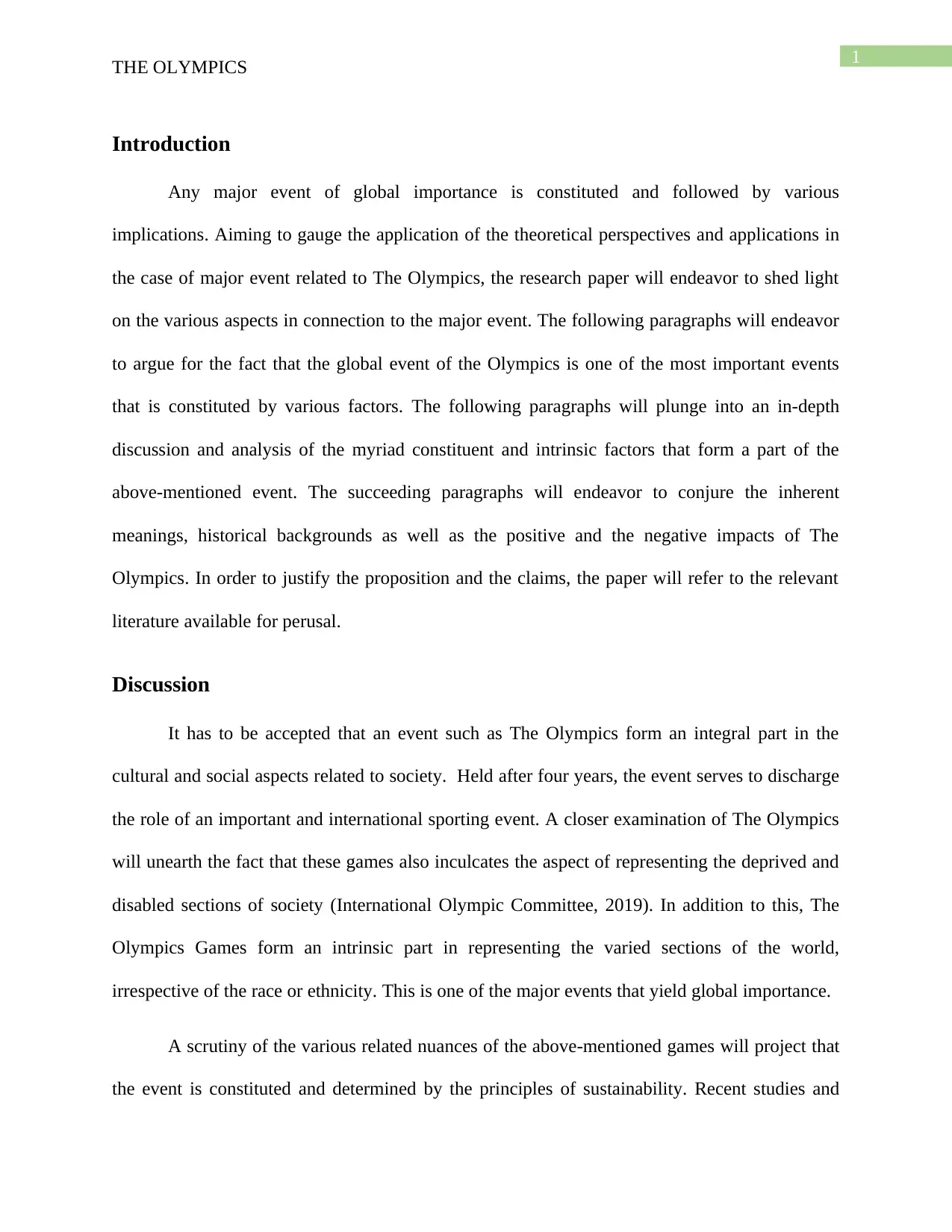
1
THE OLYMPICS
Introduction
Any major event of global importance is constituted and followed by various
implications. Aiming to gauge the application of the theoretical perspectives and applications in
the case of major event related to The Olympics, the research paper will endeavor to shed light
on the various aspects in connection to the major event. The following paragraphs will endeavor
to argue for the fact that the global event of the Olympics is one of the most important events
that is constituted by various factors. The following paragraphs will plunge into an in-depth
discussion and analysis of the myriad constituent and intrinsic factors that form a part of the
above-mentioned event. The succeeding paragraphs will endeavor to conjure the inherent
meanings, historical backgrounds as well as the positive and the negative impacts of The
Olympics. In order to justify the proposition and the claims, the paper will refer to the relevant
literature available for perusal.
Discussion
It has to be accepted that an event such as The Olympics form an integral part in the
cultural and social aspects related to society. Held after four years, the event serves to discharge
the role of an important and international sporting event. A closer examination of The Olympics
will unearth the fact that these games also inculcates the aspect of representing the deprived and
disabled sections of society (International Olympic Committee, 2019). In addition to this, The
Olympics Games form an intrinsic part in representing the varied sections of the world,
irrespective of the race or ethnicity. This is one of the major events that yield global importance.
A scrutiny of the various related nuances of the above-mentioned games will project that
the event is constituted and determined by the principles of sustainability. Recent studies and
THE OLYMPICS
Introduction
Any major event of global importance is constituted and followed by various
implications. Aiming to gauge the application of the theoretical perspectives and applications in
the case of major event related to The Olympics, the research paper will endeavor to shed light
on the various aspects in connection to the major event. The following paragraphs will endeavor
to argue for the fact that the global event of the Olympics is one of the most important events
that is constituted by various factors. The following paragraphs will plunge into an in-depth
discussion and analysis of the myriad constituent and intrinsic factors that form a part of the
above-mentioned event. The succeeding paragraphs will endeavor to conjure the inherent
meanings, historical backgrounds as well as the positive and the negative impacts of The
Olympics. In order to justify the proposition and the claims, the paper will refer to the relevant
literature available for perusal.
Discussion
It has to be accepted that an event such as The Olympics form an integral part in the
cultural and social aspects related to society. Held after four years, the event serves to discharge
the role of an important and international sporting event. A closer examination of The Olympics
will unearth the fact that these games also inculcates the aspect of representing the deprived and
disabled sections of society (International Olympic Committee, 2019). In addition to this, The
Olympics Games form an intrinsic part in representing the varied sections of the world,
irrespective of the race or ethnicity. This is one of the major events that yield global importance.
A scrutiny of the various related nuances of the above-mentioned games will project that
the event is constituted and determined by the principles of sustainability. Recent studies and
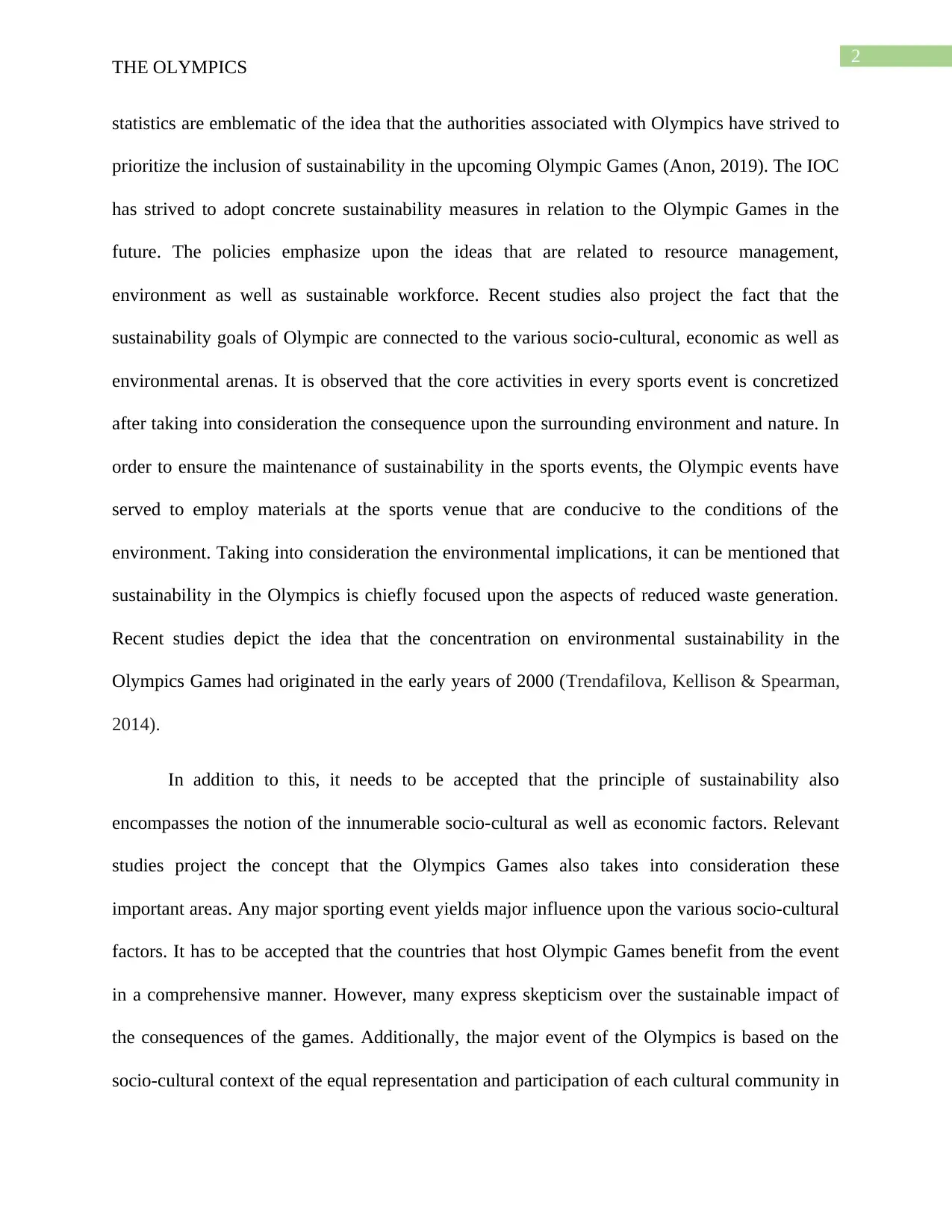
2
THE OLYMPICS
statistics are emblematic of the idea that the authorities associated with Olympics have strived to
prioritize the inclusion of sustainability in the upcoming Olympic Games (Anon, 2019). The IOC
has strived to adopt concrete sustainability measures in relation to the Olympic Games in the
future. The policies emphasize upon the ideas that are related to resource management,
environment as well as sustainable workforce. Recent studies also project the fact that the
sustainability goals of Olympic are connected to the various socio-cultural, economic as well as
environmental arenas. It is observed that the core activities in every sports event is concretized
after taking into consideration the consequence upon the surrounding environment and nature. In
order to ensure the maintenance of sustainability in the sports events, the Olympic events have
served to employ materials at the sports venue that are conducive to the conditions of the
environment. Taking into consideration the environmental implications, it can be mentioned that
sustainability in the Olympics is chiefly focused upon the aspects of reduced waste generation.
Recent studies depict the idea that the concentration on environmental sustainability in the
Olympics Games had originated in the early years of 2000 (Trendafilova, Kellison & Spearman,
2014).
In addition to this, it needs to be accepted that the principle of sustainability also
encompasses the notion of the innumerable socio-cultural as well as economic factors. Relevant
studies project the concept that the Olympics Games also takes into consideration these
important areas. Any major sporting event yields major influence upon the various socio-cultural
factors. It has to be accepted that the countries that host Olympic Games benefit from the event
in a comprehensive manner. However, many express skepticism over the sustainable impact of
the consequences of the games. Additionally, the major event of the Olympics is based on the
socio-cultural context of the equal representation and participation of each cultural community in
THE OLYMPICS
statistics are emblematic of the idea that the authorities associated with Olympics have strived to
prioritize the inclusion of sustainability in the upcoming Olympic Games (Anon, 2019). The IOC
has strived to adopt concrete sustainability measures in relation to the Olympic Games in the
future. The policies emphasize upon the ideas that are related to resource management,
environment as well as sustainable workforce. Recent studies also project the fact that the
sustainability goals of Olympic are connected to the various socio-cultural, economic as well as
environmental arenas. It is observed that the core activities in every sports event is concretized
after taking into consideration the consequence upon the surrounding environment and nature. In
order to ensure the maintenance of sustainability in the sports events, the Olympic events have
served to employ materials at the sports venue that are conducive to the conditions of the
environment. Taking into consideration the environmental implications, it can be mentioned that
sustainability in the Olympics is chiefly focused upon the aspects of reduced waste generation.
Recent studies depict the idea that the concentration on environmental sustainability in the
Olympics Games had originated in the early years of 2000 (Trendafilova, Kellison & Spearman,
2014).
In addition to this, it needs to be accepted that the principle of sustainability also
encompasses the notion of the innumerable socio-cultural as well as economic factors. Relevant
studies project the concept that the Olympics Games also takes into consideration these
important areas. Any major sporting event yields major influence upon the various socio-cultural
factors. It has to be accepted that the countries that host Olympic Games benefit from the event
in a comprehensive manner. However, many express skepticism over the sustainable impact of
the consequences of the games. Additionally, the major event of the Olympics is based on the
socio-cultural context of the equal representation and participation of each cultural community in
⊘ This is a preview!⊘
Do you want full access?
Subscribe today to unlock all pages.

Trusted by 1+ million students worldwide
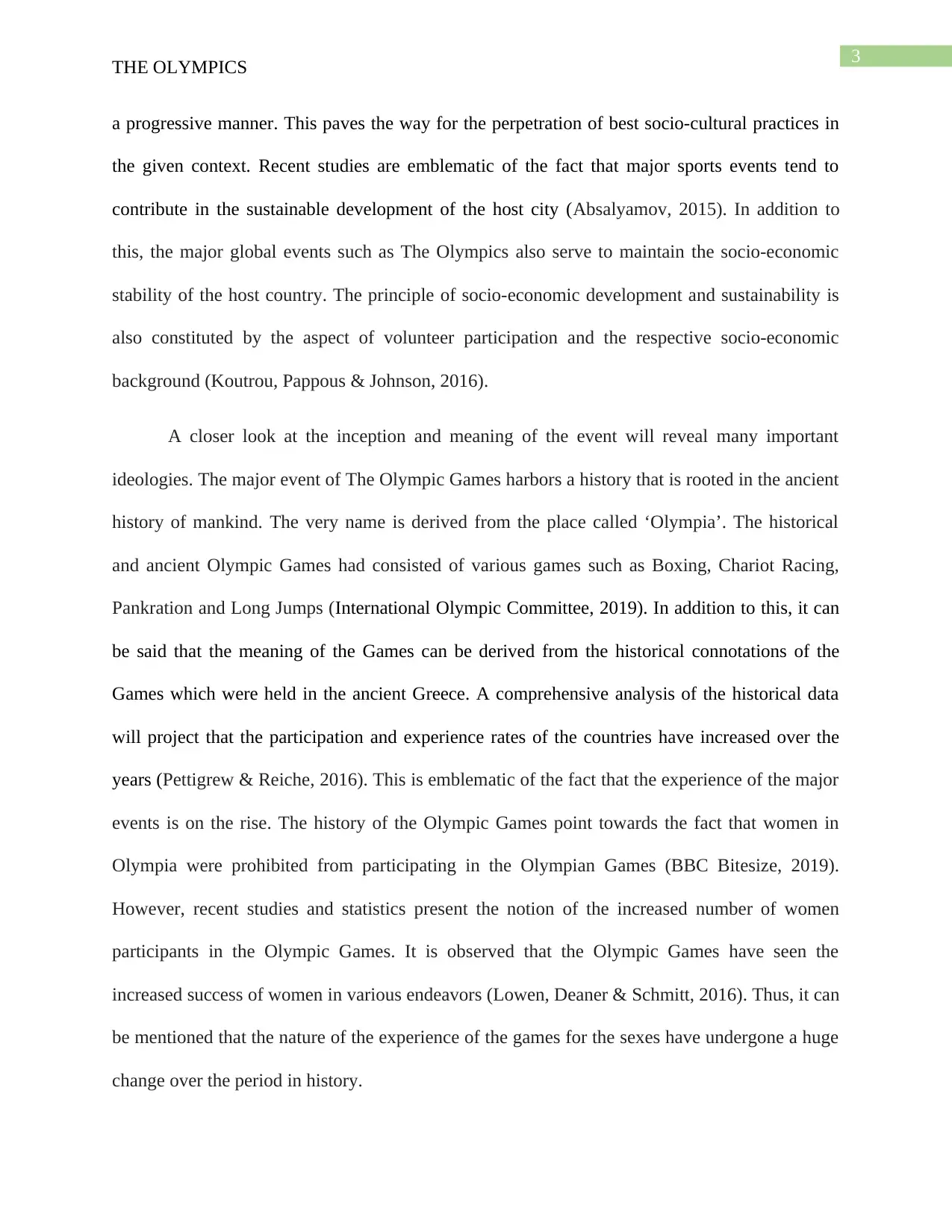
3
THE OLYMPICS
a progressive manner. This paves the way for the perpetration of best socio-cultural practices in
the given context. Recent studies are emblematic of the fact that major sports events tend to
contribute in the sustainable development of the host city (Absalyamov, 2015). In addition to
this, the major global events such as The Olympics also serve to maintain the socio-economic
stability of the host country. The principle of socio-economic development and sustainability is
also constituted by the aspect of volunteer participation and the respective socio-economic
background (Koutrou, Pappous & Johnson, 2016).
A closer look at the inception and meaning of the event will reveal many important
ideologies. The major event of The Olympic Games harbors a history that is rooted in the ancient
history of mankind. The very name is derived from the place called ‘Olympia’. The historical
and ancient Olympic Games had consisted of various games such as Boxing, Chariot Racing,
Pankration and Long Jumps (International Olympic Committee, 2019). In addition to this, it can
be said that the meaning of the Games can be derived from the historical connotations of the
Games which were held in the ancient Greece. A comprehensive analysis of the historical data
will project that the participation and experience rates of the countries have increased over the
years (Pettigrew & Reiche, 2016). This is emblematic of the fact that the experience of the major
events is on the rise. The history of the Olympic Games point towards the fact that women in
Olympia were prohibited from participating in the Olympian Games (BBC Bitesize, 2019).
However, recent studies and statistics present the notion of the increased number of women
participants in the Olympic Games. It is observed that the Olympic Games have seen the
increased success of women in various endeavors (Lowen, Deaner & Schmitt, 2016). Thus, it can
be mentioned that the nature of the experience of the games for the sexes have undergone a huge
change over the period in history.
THE OLYMPICS
a progressive manner. This paves the way for the perpetration of best socio-cultural practices in
the given context. Recent studies are emblematic of the fact that major sports events tend to
contribute in the sustainable development of the host city (Absalyamov, 2015). In addition to
this, the major global events such as The Olympics also serve to maintain the socio-economic
stability of the host country. The principle of socio-economic development and sustainability is
also constituted by the aspect of volunteer participation and the respective socio-economic
background (Koutrou, Pappous & Johnson, 2016).
A closer look at the inception and meaning of the event will reveal many important
ideologies. The major event of The Olympic Games harbors a history that is rooted in the ancient
history of mankind. The very name is derived from the place called ‘Olympia’. The historical
and ancient Olympic Games had consisted of various games such as Boxing, Chariot Racing,
Pankration and Long Jumps (International Olympic Committee, 2019). In addition to this, it can
be said that the meaning of the Games can be derived from the historical connotations of the
Games which were held in the ancient Greece. A comprehensive analysis of the historical data
will project that the participation and experience rates of the countries have increased over the
years (Pettigrew & Reiche, 2016). This is emblematic of the fact that the experience of the major
events is on the rise. The history of the Olympic Games point towards the fact that women in
Olympia were prohibited from participating in the Olympian Games (BBC Bitesize, 2019).
However, recent studies and statistics present the notion of the increased number of women
participants in the Olympic Games. It is observed that the Olympic Games have seen the
increased success of women in various endeavors (Lowen, Deaner & Schmitt, 2016). Thus, it can
be mentioned that the nature of the experience of the games for the sexes have undergone a huge
change over the period in history.
Paraphrase This Document
Need a fresh take? Get an instant paraphrase of this document with our AI Paraphraser
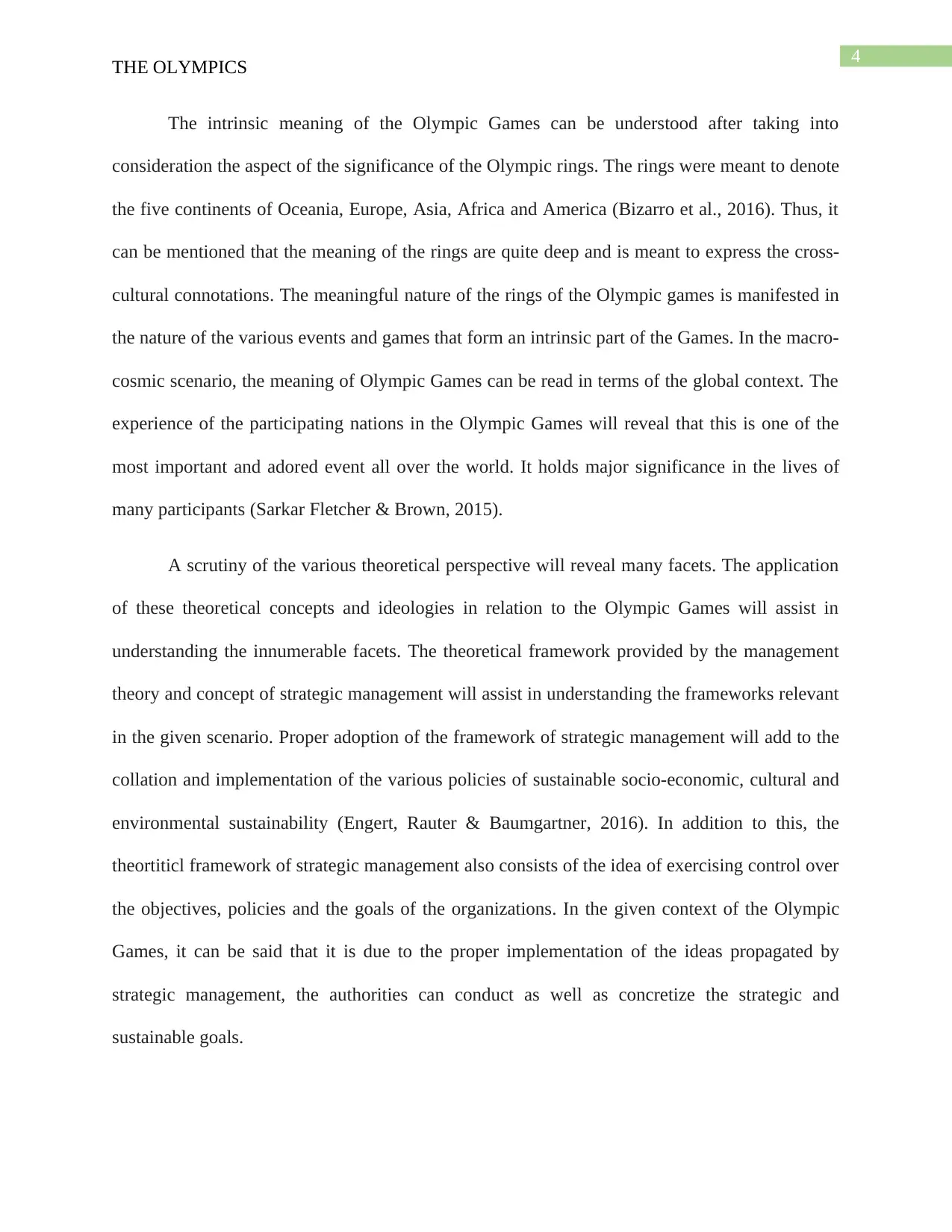
4
THE OLYMPICS
The intrinsic meaning of the Olympic Games can be understood after taking into
consideration the aspect of the significance of the Olympic rings. The rings were meant to denote
the five continents of Oceania, Europe, Asia, Africa and America (Bizarro et al., 2016). Thus, it
can be mentioned that the meaning of the rings are quite deep and is meant to express the cross-
cultural connotations. The meaningful nature of the rings of the Olympic games is manifested in
the nature of the various events and games that form an intrinsic part of the Games. In the macro-
cosmic scenario, the meaning of Olympic Games can be read in terms of the global context. The
experience of the participating nations in the Olympic Games will reveal that this is one of the
most important and adored event all over the world. It holds major significance in the lives of
many participants (Sarkar Fletcher & Brown, 2015).
A scrutiny of the various theoretical perspective will reveal many facets. The application
of these theoretical concepts and ideologies in relation to the Olympic Games will assist in
understanding the innumerable facets. The theoretical framework provided by the management
theory and concept of strategic management will assist in understanding the frameworks relevant
in the given scenario. Proper adoption of the framework of strategic management will add to the
collation and implementation of the various policies of sustainable socio-economic, cultural and
environmental sustainability (Engert, Rauter & Baumgartner, 2016). In addition to this, the
theortiticl framework of strategic management also consists of the idea of exercising control over
the objectives, policies and the goals of the organizations. In the given context of the Olympic
Games, it can be said that it is due to the proper implementation of the ideas propagated by
strategic management, the authorities can conduct as well as concretize the strategic and
sustainable goals.
THE OLYMPICS
The intrinsic meaning of the Olympic Games can be understood after taking into
consideration the aspect of the significance of the Olympic rings. The rings were meant to denote
the five continents of Oceania, Europe, Asia, Africa and America (Bizarro et al., 2016). Thus, it
can be mentioned that the meaning of the rings are quite deep and is meant to express the cross-
cultural connotations. The meaningful nature of the rings of the Olympic games is manifested in
the nature of the various events and games that form an intrinsic part of the Games. In the macro-
cosmic scenario, the meaning of Olympic Games can be read in terms of the global context. The
experience of the participating nations in the Olympic Games will reveal that this is one of the
most important and adored event all over the world. It holds major significance in the lives of
many participants (Sarkar Fletcher & Brown, 2015).
A scrutiny of the various theoretical perspective will reveal many facets. The application
of these theoretical concepts and ideologies in relation to the Olympic Games will assist in
understanding the innumerable facets. The theoretical framework provided by the management
theory and concept of strategic management will assist in understanding the frameworks relevant
in the given scenario. Proper adoption of the framework of strategic management will add to the
collation and implementation of the various policies of sustainable socio-economic, cultural and
environmental sustainability (Engert, Rauter & Baumgartner, 2016). In addition to this, the
theortiticl framework of strategic management also consists of the idea of exercising control over
the objectives, policies and the goals of the organizations. In the given context of the Olympic
Games, it can be said that it is due to the proper implementation of the ideas propagated by
strategic management, the authorities can conduct as well as concretize the strategic and
sustainable goals.
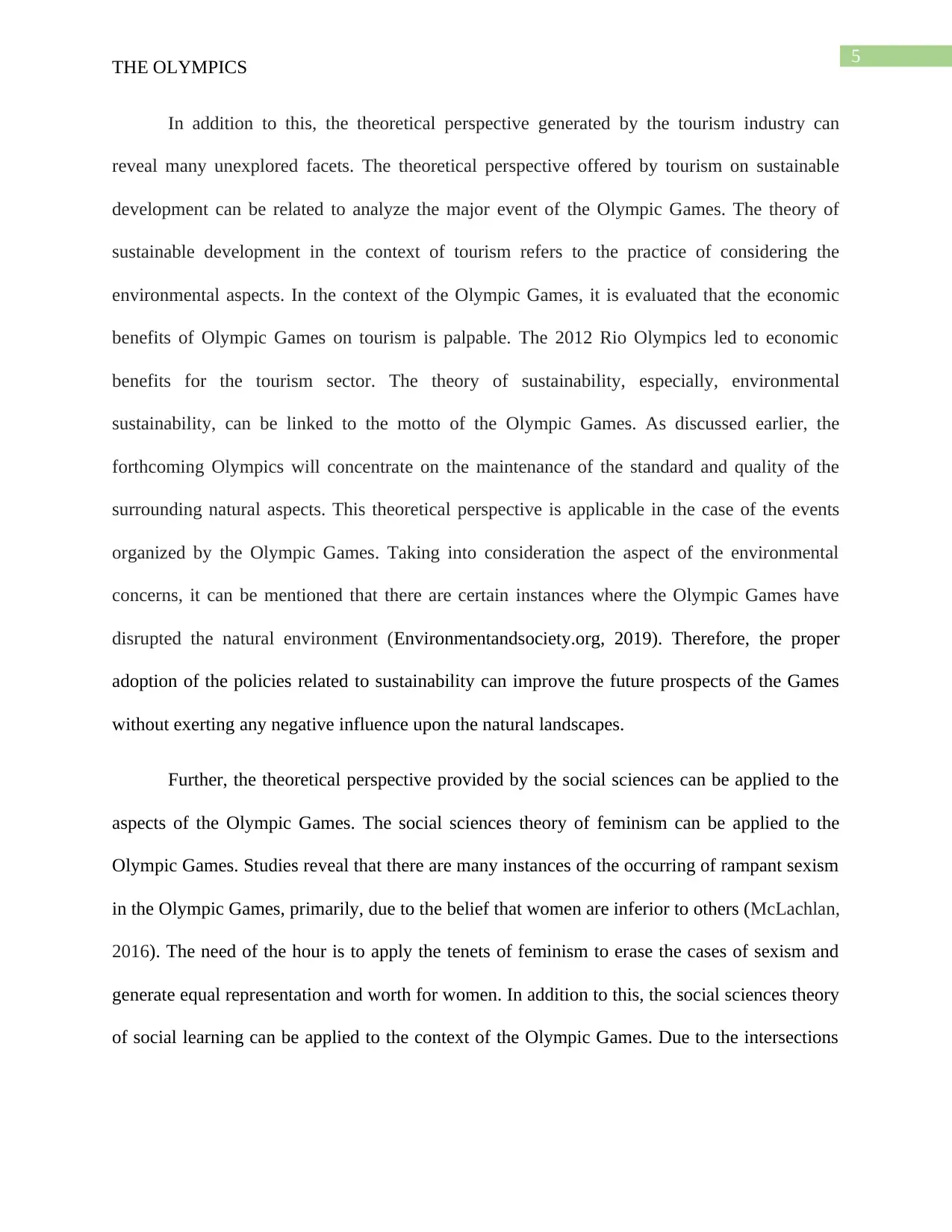
5
THE OLYMPICS
In addition to this, the theoretical perspective generated by the tourism industry can
reveal many unexplored facets. The theoretical perspective offered by tourism on sustainable
development can be related to analyze the major event of the Olympic Games. The theory of
sustainable development in the context of tourism refers to the practice of considering the
environmental aspects. In the context of the Olympic Games, it is evaluated that the economic
benefits of Olympic Games on tourism is palpable. The 2012 Rio Olympics led to economic
benefits for the tourism sector. The theory of sustainability, especially, environmental
sustainability, can be linked to the motto of the Olympic Games. As discussed earlier, the
forthcoming Olympics will concentrate on the maintenance of the standard and quality of the
surrounding natural aspects. This theoretical perspective is applicable in the case of the events
organized by the Olympic Games. Taking into consideration the aspect of the environmental
concerns, it can be mentioned that there are certain instances where the Olympic Games have
disrupted the natural environment (Environmentandsociety.org, 2019). Therefore, the proper
adoption of the policies related to sustainability can improve the future prospects of the Games
without exerting any negative influence upon the natural landscapes.
Further, the theoretical perspective provided by the social sciences can be applied to the
aspects of the Olympic Games. The social sciences theory of feminism can be applied to the
Olympic Games. Studies reveal that there are many instances of the occurring of rampant sexism
in the Olympic Games, primarily, due to the belief that women are inferior to others (McLachlan,
2016). The need of the hour is to apply the tenets of feminism to erase the cases of sexism and
generate equal representation and worth for women. In addition to this, the social sciences theory
of social learning can be applied to the context of the Olympic Games. Due to the intersections
THE OLYMPICS
In addition to this, the theoretical perspective generated by the tourism industry can
reveal many unexplored facets. The theoretical perspective offered by tourism on sustainable
development can be related to analyze the major event of the Olympic Games. The theory of
sustainable development in the context of tourism refers to the practice of considering the
environmental aspects. In the context of the Olympic Games, it is evaluated that the economic
benefits of Olympic Games on tourism is palpable. The 2012 Rio Olympics led to economic
benefits for the tourism sector. The theory of sustainability, especially, environmental
sustainability, can be linked to the motto of the Olympic Games. As discussed earlier, the
forthcoming Olympics will concentrate on the maintenance of the standard and quality of the
surrounding natural aspects. This theoretical perspective is applicable in the case of the events
organized by the Olympic Games. Taking into consideration the aspect of the environmental
concerns, it can be mentioned that there are certain instances where the Olympic Games have
disrupted the natural environment (Environmentandsociety.org, 2019). Therefore, the proper
adoption of the policies related to sustainability can improve the future prospects of the Games
without exerting any negative influence upon the natural landscapes.
Further, the theoretical perspective provided by the social sciences can be applied to the
aspects of the Olympic Games. The social sciences theory of feminism can be applied to the
Olympic Games. Studies reveal that there are many instances of the occurring of rampant sexism
in the Olympic Games, primarily, due to the belief that women are inferior to others (McLachlan,
2016). The need of the hour is to apply the tenets of feminism to erase the cases of sexism and
generate equal representation and worth for women. In addition to this, the social sciences theory
of social learning can be applied to the context of the Olympic Games. Due to the intersections
⊘ This is a preview!⊘
Do you want full access?
Subscribe today to unlock all pages.

Trusted by 1+ million students worldwide
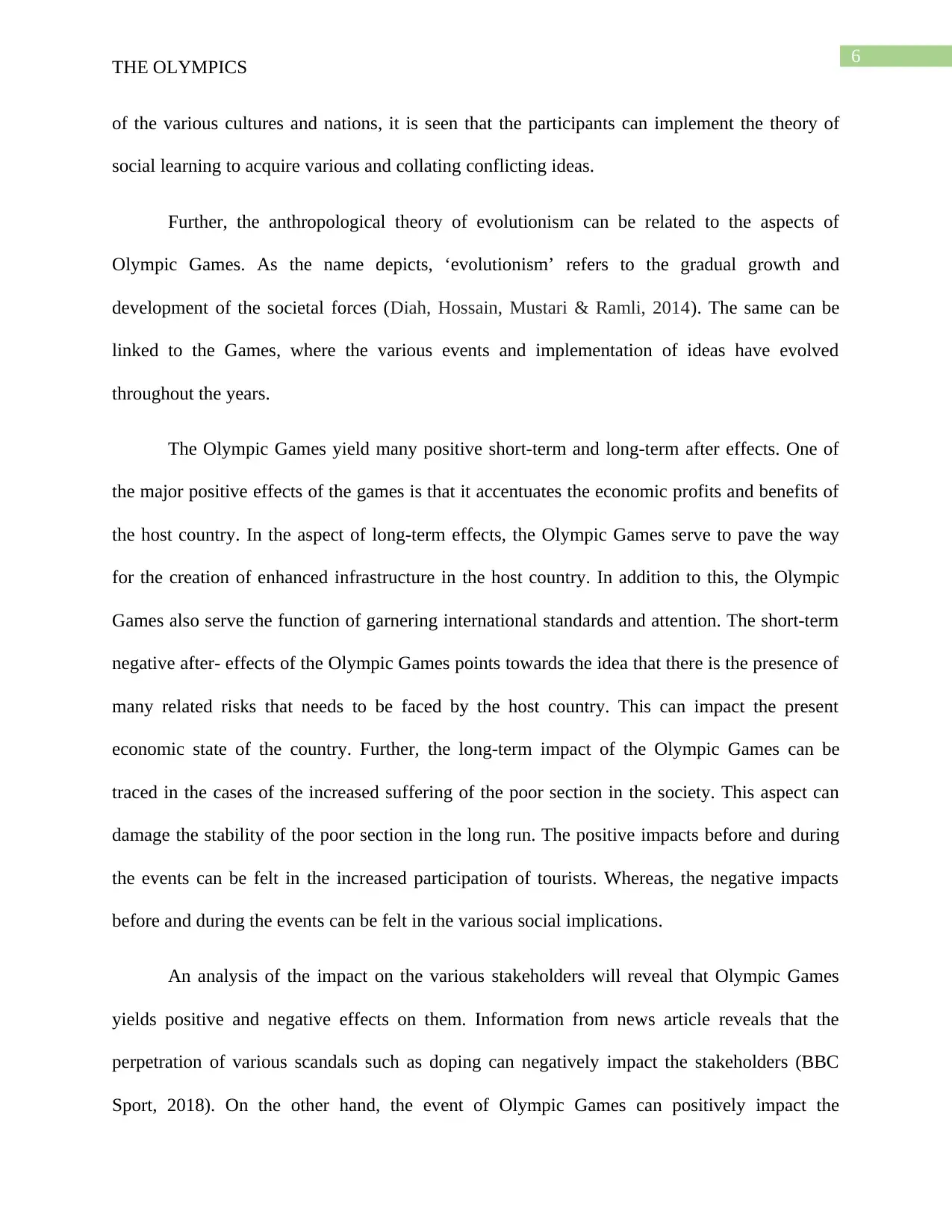
6
THE OLYMPICS
of the various cultures and nations, it is seen that the participants can implement the theory of
social learning to acquire various and collating conflicting ideas.
Further, the anthropological theory of evolutionism can be related to the aspects of
Olympic Games. As the name depicts, ‘evolutionism’ refers to the gradual growth and
development of the societal forces (Diah, Hossain, Mustari & Ramli, 2014). The same can be
linked to the Games, where the various events and implementation of ideas have evolved
throughout the years.
The Olympic Games yield many positive short-term and long-term after effects. One of
the major positive effects of the games is that it accentuates the economic profits and benefits of
the host country. In the aspect of long-term effects, the Olympic Games serve to pave the way
for the creation of enhanced infrastructure in the host country. In addition to this, the Olympic
Games also serve the function of garnering international standards and attention. The short-term
negative after- effects of the Olympic Games points towards the idea that there is the presence of
many related risks that needs to be faced by the host country. This can impact the present
economic state of the country. Further, the long-term impact of the Olympic Games can be
traced in the cases of the increased suffering of the poor section in the society. This aspect can
damage the stability of the poor section in the long run. The positive impacts before and during
the events can be felt in the increased participation of tourists. Whereas, the negative impacts
before and during the events can be felt in the various social implications.
An analysis of the impact on the various stakeholders will reveal that Olympic Games
yields positive and negative effects on them. Information from news article reveals that the
perpetration of various scandals such as doping can negatively impact the stakeholders (BBC
Sport, 2018). On the other hand, the event of Olympic Games can positively impact the
THE OLYMPICS
of the various cultures and nations, it is seen that the participants can implement the theory of
social learning to acquire various and collating conflicting ideas.
Further, the anthropological theory of evolutionism can be related to the aspects of
Olympic Games. As the name depicts, ‘evolutionism’ refers to the gradual growth and
development of the societal forces (Diah, Hossain, Mustari & Ramli, 2014). The same can be
linked to the Games, where the various events and implementation of ideas have evolved
throughout the years.
The Olympic Games yield many positive short-term and long-term after effects. One of
the major positive effects of the games is that it accentuates the economic profits and benefits of
the host country. In the aspect of long-term effects, the Olympic Games serve to pave the way
for the creation of enhanced infrastructure in the host country. In addition to this, the Olympic
Games also serve the function of garnering international standards and attention. The short-term
negative after- effects of the Olympic Games points towards the idea that there is the presence of
many related risks that needs to be faced by the host country. This can impact the present
economic state of the country. Further, the long-term impact of the Olympic Games can be
traced in the cases of the increased suffering of the poor section in the society. This aspect can
damage the stability of the poor section in the long run. The positive impacts before and during
the events can be felt in the increased participation of tourists. Whereas, the negative impacts
before and during the events can be felt in the various social implications.
An analysis of the impact on the various stakeholders will reveal that Olympic Games
yields positive and negative effects on them. Information from news article reveals that the
perpetration of various scandals such as doping can negatively impact the stakeholders (BBC
Sport, 2018). On the other hand, the event of Olympic Games can positively impact the
Paraphrase This Document
Need a fresh take? Get an instant paraphrase of this document with our AI Paraphraser
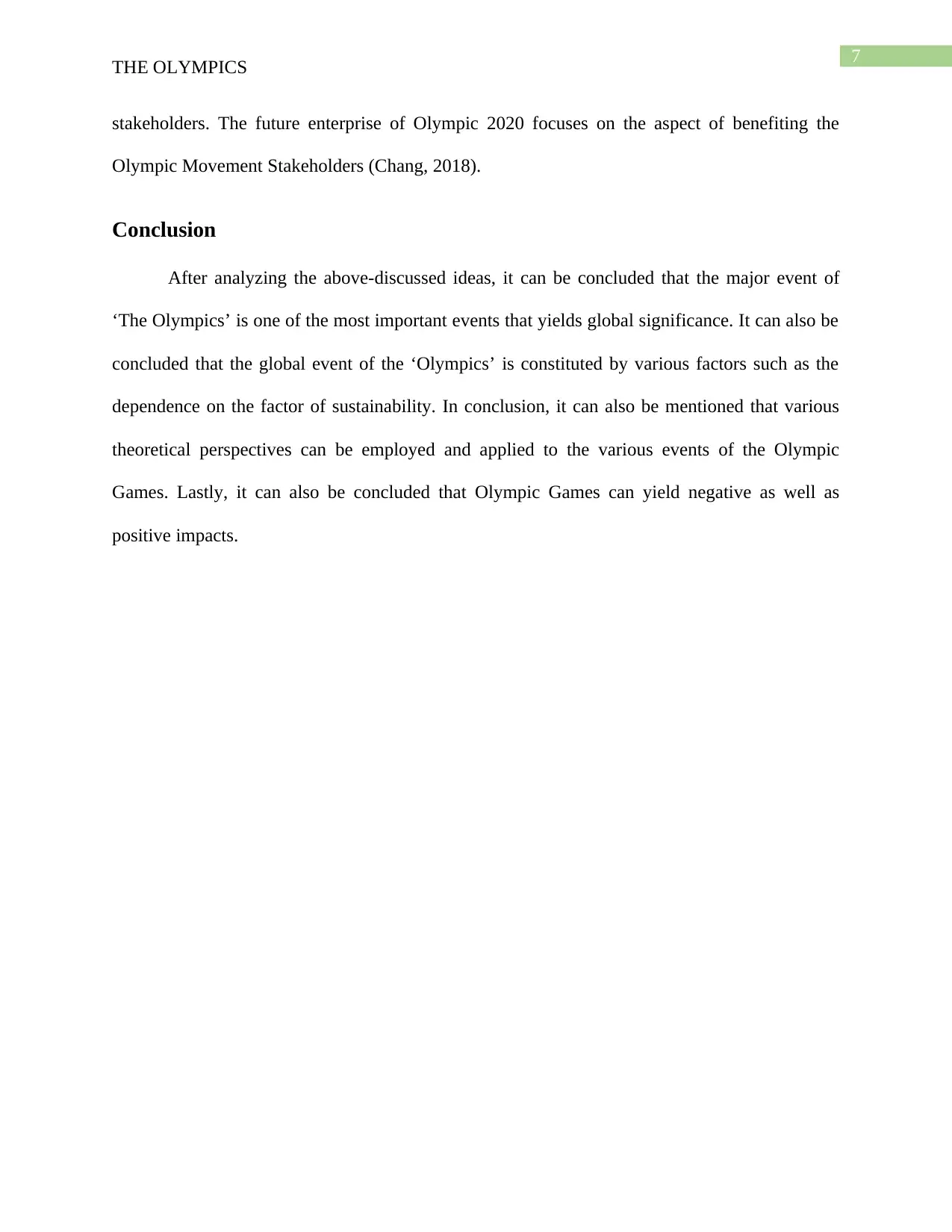
7
THE OLYMPICS
stakeholders. The future enterprise of Olympic 2020 focuses on the aspect of benefiting the
Olympic Movement Stakeholders (Chang, 2018).
Conclusion
After analyzing the above-discussed ideas, it can be concluded that the major event of
‘The Olympics’ is one of the most important events that yields global significance. It can also be
concluded that the global event of the ‘Olympics’ is constituted by various factors such as the
dependence on the factor of sustainability. In conclusion, it can also be mentioned that various
theoretical perspectives can be employed and applied to the various events of the Olympic
Games. Lastly, it can also be concluded that Olympic Games can yield negative as well as
positive impacts.
THE OLYMPICS
stakeholders. The future enterprise of Olympic 2020 focuses on the aspect of benefiting the
Olympic Movement Stakeholders (Chang, 2018).
Conclusion
After analyzing the above-discussed ideas, it can be concluded that the major event of
‘The Olympics’ is one of the most important events that yields global significance. It can also be
concluded that the global event of the ‘Olympics’ is constituted by various factors such as the
dependence on the factor of sustainability. In conclusion, it can also be mentioned that various
theoretical perspectives can be employed and applied to the various events of the Olympic
Games. Lastly, it can also be concluded that Olympic Games can yield negative as well as
positive impacts.
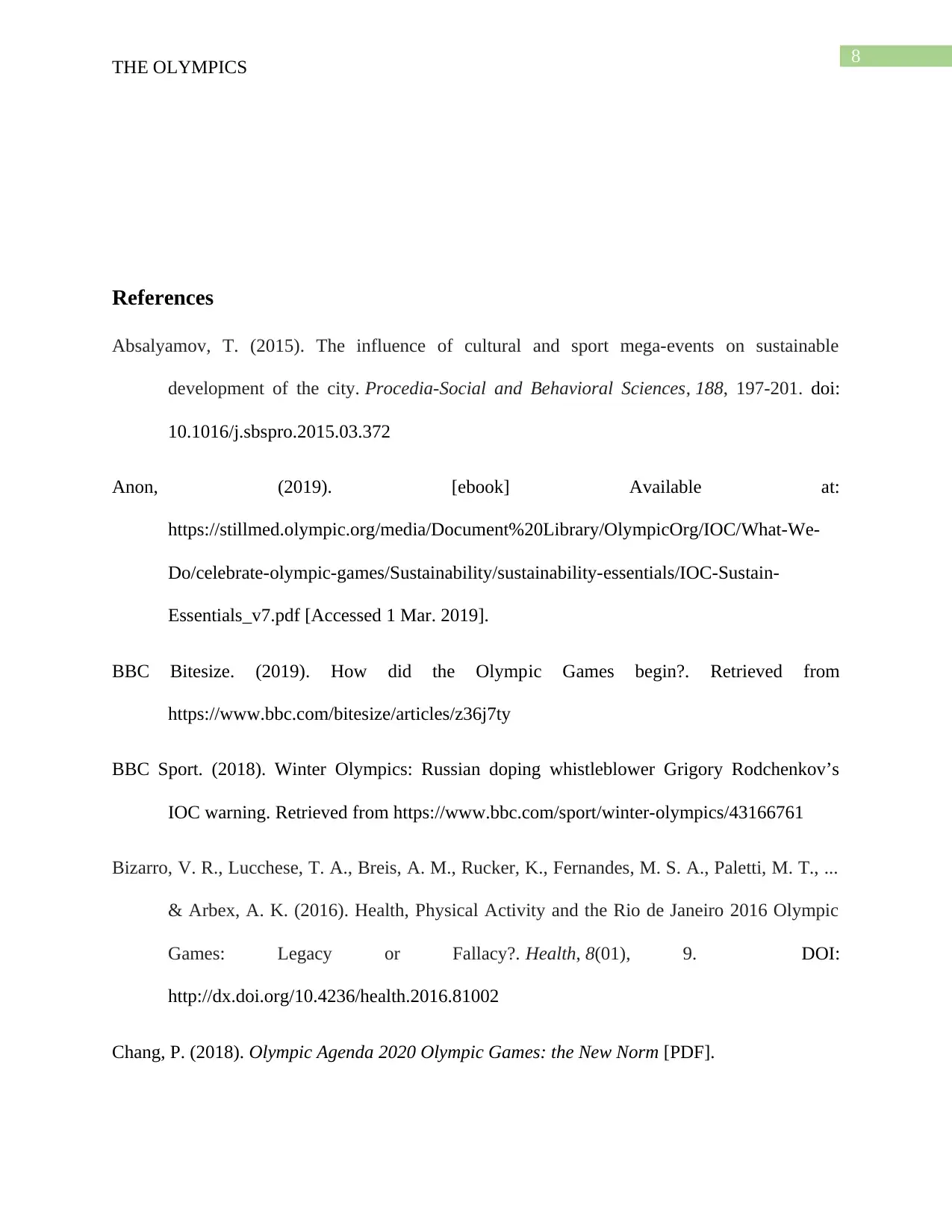
8
THE OLYMPICS
References
Absalyamov, T. (2015). The influence of cultural and sport mega-events on sustainable
development of the city. Procedia-Social and Behavioral Sciences, 188, 197-201. doi:
10.1016/j.sbspro.2015.03.372
Anon, (2019). [ebook] Available at:
https://stillmed.olympic.org/media/Document%20Library/OlympicOrg/IOC/What-We-
Do/celebrate-olympic-games/Sustainability/sustainability-essentials/IOC-Sustain-
Essentials_v7.pdf [Accessed 1 Mar. 2019].
BBC Bitesize. (2019). How did the Olympic Games begin?. Retrieved from
https://www.bbc.com/bitesize/articles/z36j7ty
BBC Sport. (2018). Winter Olympics: Russian doping whistleblower Grigory Rodchenkov’s
IOC warning. Retrieved from https://www.bbc.com/sport/winter-olympics/43166761
Bizarro, V. R., Lucchese, T. A., Breis, A. M., Rucker, K., Fernandes, M. S. A., Paletti, M. T., ...
& Arbex, A. K. (2016). Health, Physical Activity and the Rio de Janeiro 2016 Olympic
Games: Legacy or Fallacy?. Health, 8(01), 9. DOI:
http://dx.doi.org/10.4236/health.2016.81002
Chang, P. (2018). Olympic Agenda 2020 Olympic Games: the New Norm [PDF].
THE OLYMPICS
References
Absalyamov, T. (2015). The influence of cultural and sport mega-events on sustainable
development of the city. Procedia-Social and Behavioral Sciences, 188, 197-201. doi:
10.1016/j.sbspro.2015.03.372
Anon, (2019). [ebook] Available at:
https://stillmed.olympic.org/media/Document%20Library/OlympicOrg/IOC/What-We-
Do/celebrate-olympic-games/Sustainability/sustainability-essentials/IOC-Sustain-
Essentials_v7.pdf [Accessed 1 Mar. 2019].
BBC Bitesize. (2019). How did the Olympic Games begin?. Retrieved from
https://www.bbc.com/bitesize/articles/z36j7ty
BBC Sport. (2018). Winter Olympics: Russian doping whistleblower Grigory Rodchenkov’s
IOC warning. Retrieved from https://www.bbc.com/sport/winter-olympics/43166761
Bizarro, V. R., Lucchese, T. A., Breis, A. M., Rucker, K., Fernandes, M. S. A., Paletti, M. T., ...
& Arbex, A. K. (2016). Health, Physical Activity and the Rio de Janeiro 2016 Olympic
Games: Legacy or Fallacy?. Health, 8(01), 9. DOI:
http://dx.doi.org/10.4236/health.2016.81002
Chang, P. (2018). Olympic Agenda 2020 Olympic Games: the New Norm [PDF].
⊘ This is a preview!⊘
Do you want full access?
Subscribe today to unlock all pages.

Trusted by 1+ million students worldwide
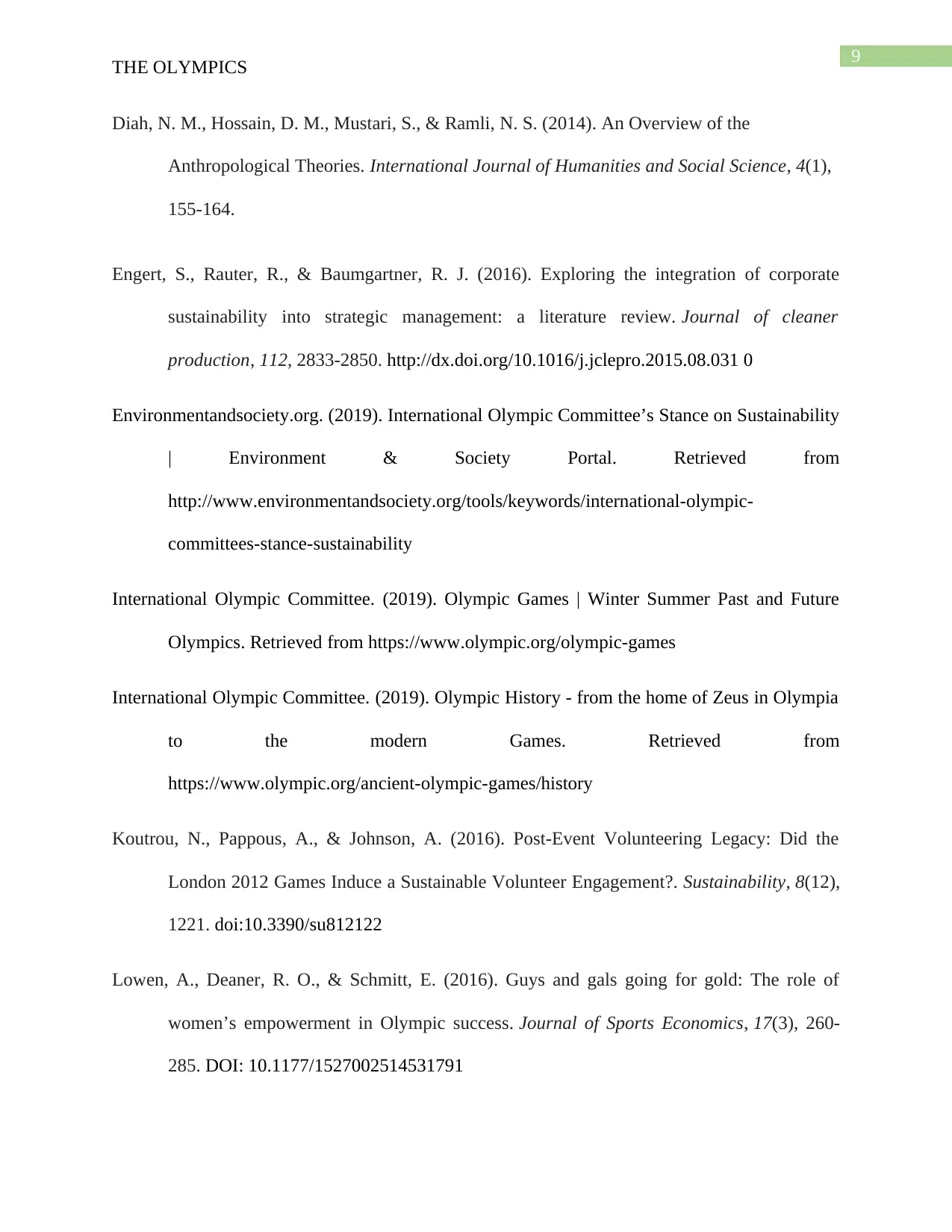
9
THE OLYMPICS
Diah, N. M., Hossain, D. M., Mustari, S., & Ramli, N. S. (2014). An Overview of the
Anthropological Theories. International Journal of Humanities and Social Science, 4(1),
155-164.
Engert, S., Rauter, R., & Baumgartner, R. J. (2016). Exploring the integration of corporate
sustainability into strategic management: a literature review. Journal of cleaner
production, 112, 2833-2850. http://dx.doi.org/10.1016/j.jclepro.2015.08.031 0
Environmentandsociety.org. (2019). International Olympic Committee’s Stance on Sustainability
| Environment & Society Portal. Retrieved from
http://www.environmentandsociety.org/tools/keywords/international-olympic-
committees-stance-sustainability
International Olympic Committee. (2019). Olympic Games | Winter Summer Past and Future
Olympics. Retrieved from https://www.olympic.org/olympic-games
International Olympic Committee. (2019). Olympic History - from the home of Zeus in Olympia
to the modern Games. Retrieved from
https://www.olympic.org/ancient-olympic-games/history
Koutrou, N., Pappous, A., & Johnson, A. (2016). Post-Event Volunteering Legacy: Did the
London 2012 Games Induce a Sustainable Volunteer Engagement?. Sustainability, 8(12),
1221. doi:10.3390/su812122
Lowen, A., Deaner, R. O., & Schmitt, E. (2016). Guys and gals going for gold: The role of
women’s empowerment in Olympic success. Journal of Sports Economics, 17(3), 260-
285. DOI: 10.1177/1527002514531791
THE OLYMPICS
Diah, N. M., Hossain, D. M., Mustari, S., & Ramli, N. S. (2014). An Overview of the
Anthropological Theories. International Journal of Humanities and Social Science, 4(1),
155-164.
Engert, S., Rauter, R., & Baumgartner, R. J. (2016). Exploring the integration of corporate
sustainability into strategic management: a literature review. Journal of cleaner
production, 112, 2833-2850. http://dx.doi.org/10.1016/j.jclepro.2015.08.031 0
Environmentandsociety.org. (2019). International Olympic Committee’s Stance on Sustainability
| Environment & Society Portal. Retrieved from
http://www.environmentandsociety.org/tools/keywords/international-olympic-
committees-stance-sustainability
International Olympic Committee. (2019). Olympic Games | Winter Summer Past and Future
Olympics. Retrieved from https://www.olympic.org/olympic-games
International Olympic Committee. (2019). Olympic History - from the home of Zeus in Olympia
to the modern Games. Retrieved from
https://www.olympic.org/ancient-olympic-games/history
Koutrou, N., Pappous, A., & Johnson, A. (2016). Post-Event Volunteering Legacy: Did the
London 2012 Games Induce a Sustainable Volunteer Engagement?. Sustainability, 8(12),
1221. doi:10.3390/su812122
Lowen, A., Deaner, R. O., & Schmitt, E. (2016). Guys and gals going for gold: The role of
women’s empowerment in Olympic success. Journal of Sports Economics, 17(3), 260-
285. DOI: 10.1177/1527002514531791
Paraphrase This Document
Need a fresh take? Get an instant paraphrase of this document with our AI Paraphraser
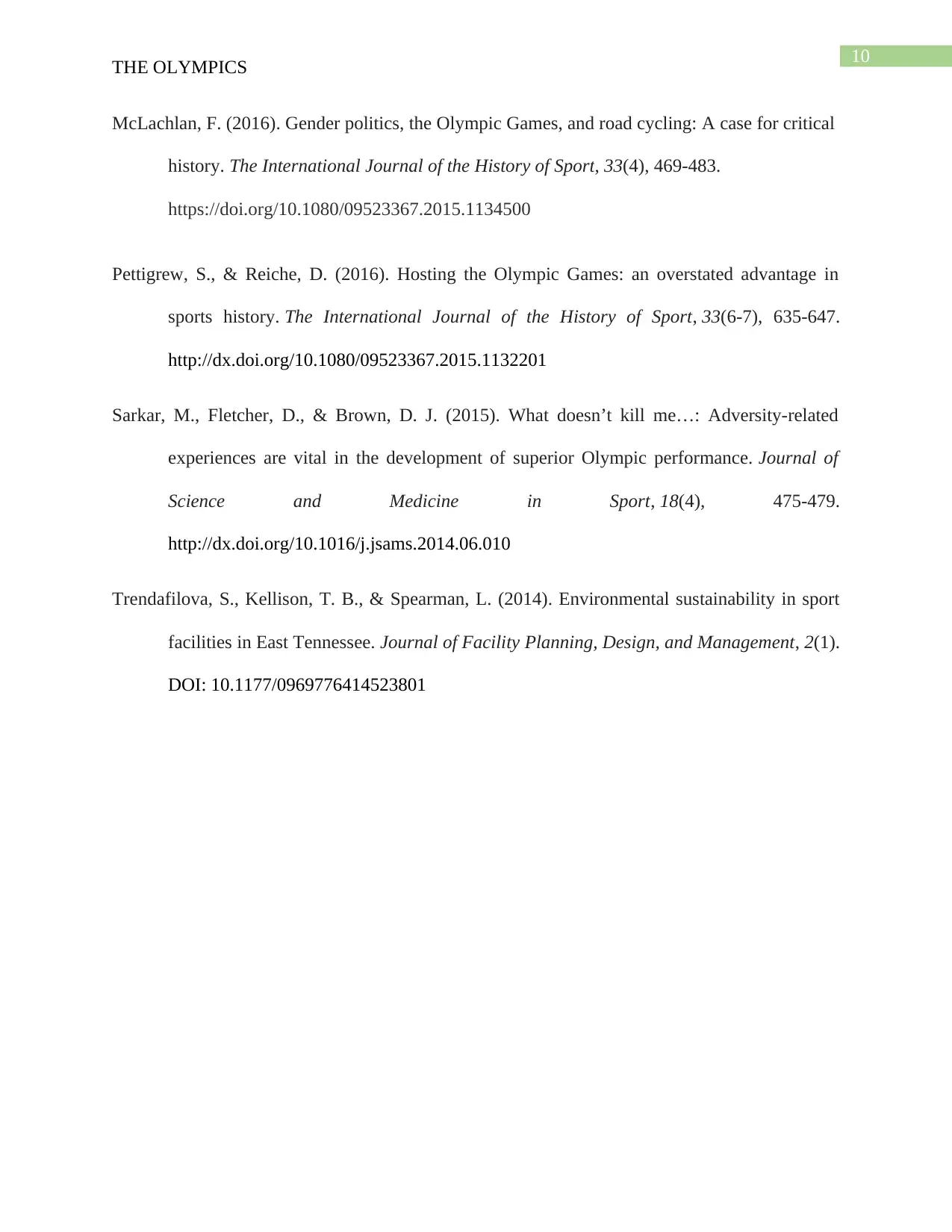
10
THE OLYMPICS
McLachlan, F. (2016). Gender politics, the Olympic Games, and road cycling: A case for critical
history. The International Journal of the History of Sport, 33(4), 469-483.
https://doi.org/10.1080/09523367.2015.1134500
Pettigrew, S., & Reiche, D. (2016). Hosting the Olympic Games: an overstated advantage in
sports history. The International Journal of the History of Sport, 33(6-7), 635-647.
http://dx.doi.org/10.1080/09523367.2015.1132201
Sarkar, M., Fletcher, D., & Brown, D. J. (2015). What doesn’t kill me…: Adversity-related
experiences are vital in the development of superior Olympic performance. Journal of
Science and Medicine in Sport, 18(4), 475-479.
http://dx.doi.org/10.1016/j.jsams.2014.06.010
Trendafilova, S., Kellison, T. B., & Spearman, L. (2014). Environmental sustainability in sport
facilities in East Tennessee. Journal of Facility Planning, Design, and Management, 2(1).
DOI: 10.1177/0969776414523801
THE OLYMPICS
McLachlan, F. (2016). Gender politics, the Olympic Games, and road cycling: A case for critical
history. The International Journal of the History of Sport, 33(4), 469-483.
https://doi.org/10.1080/09523367.2015.1134500
Pettigrew, S., & Reiche, D. (2016). Hosting the Olympic Games: an overstated advantage in
sports history. The International Journal of the History of Sport, 33(6-7), 635-647.
http://dx.doi.org/10.1080/09523367.2015.1132201
Sarkar, M., Fletcher, D., & Brown, D. J. (2015). What doesn’t kill me…: Adversity-related
experiences are vital in the development of superior Olympic performance. Journal of
Science and Medicine in Sport, 18(4), 475-479.
http://dx.doi.org/10.1016/j.jsams.2014.06.010
Trendafilova, S., Kellison, T. B., & Spearman, L. (2014). Environmental sustainability in sport
facilities in East Tennessee. Journal of Facility Planning, Design, and Management, 2(1).
DOI: 10.1177/0969776414523801
1 out of 11
Related Documents
Your All-in-One AI-Powered Toolkit for Academic Success.
+13062052269
info@desklib.com
Available 24*7 on WhatsApp / Email
![[object Object]](/_next/static/media/star-bottom.7253800d.svg)
Unlock your academic potential
Copyright © 2020–2026 A2Z Services. All Rights Reserved. Developed and managed by ZUCOL.





